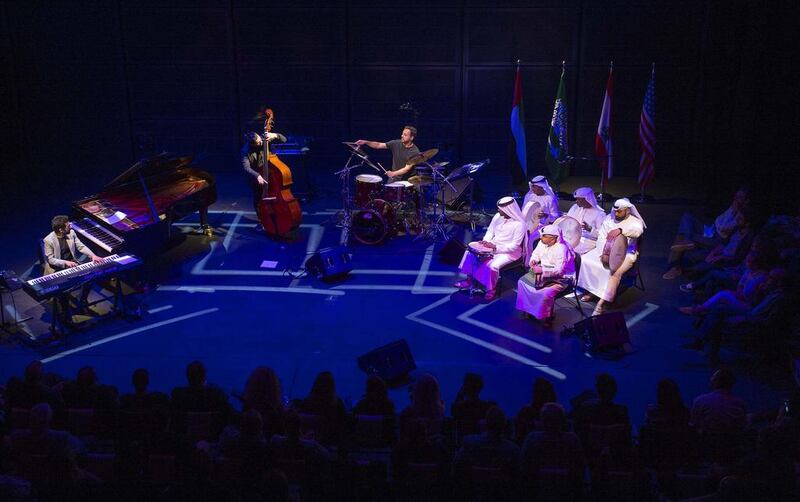In the 21st century, musical fusions are commonplace – but just by looking at the stage, with closed ears, one might detect something novel about this starkly juxtaposed sonic line-up.
To the left, a typical jazz trio – keys, double bass, drums. To the right, a five-piece Emirati percussion troupe, performing in a Bedouin tradition rarely heard outside the Gulf.
The occasion was the live debut of pianist Tarek Yamani's new album Peninsular, a project commissioned by and unveiled onstage as part of the Abu Dhabi Festival, with the world premiere at The Arts Centre at NYU Abu Dhabi on March 19.
Subtitled Portraits in Khaleeji Rhythms and Jazz, the project has seen the Lebanese pianist compose stark, jazz-influenced original material, tracked to the rhythmic churn of the Gulf’s hypnotic percussive patterns.
In the fidgety opening title track Peninsular, Yamani's hands spiral out a haunting, Arabian melody on electric piano, over a shifting harmonic base locked to the khaliji 'arabi. There's a hint of Chick Corea when the pianist shifts to acoustic for the soulfully Spanish-tinged vamp Samrias, based on the coastal bandari beat. Locked around the khaleeji rhumba, the groove is deepest on the catchy Hala Sound – the album's opening single – which combines a hard-bop simplicity Horace Silver would be proud of over a head-nodding beat still heard booming from regional radios today.
Here we might find the project’s mission statement best fulfilled: exploring and exposing the common rhythmic nuances shared between jazz and Bedouin traditions. This distinct musical “swing” reached both continents from Africa, a connection spelled out on Gate of Tears – a moody, trippy vamp named in tribute to a well-trodden slave trade passage – which brought out the band’s deepest, freest musical expositions.
UAE-based Yamani is supported by a core rhythm section of longterm collaborators. Drummer Khaled Yassine artfully weaves in and around the percussion troupe’s steadfast heave – at times stating and leading the beat, others offering mere pastel percussive shades. Scene veteran Elie Afif locks down the steady bass grooves which ground the band-leader’s increasingly frenzied excursions. Yet Yamani marks a distinctly cerebral soloist, his two hands often spilling lead lines in harmony or unison – rather than traditional chord comping-plus-lead-line – trilling restlessly up and down the keys utilising his extensive, studied harmonic toolkit.
Peninsular marks Yamani’s third release, and follows his excellent Lisan Al Tarab, an exploration of classical Levantine compositions in a jazz trio context. The 36-year-old pianist earlier shared hopes Peninsular could help open new doors, introducing the Gulf’s under-acknowledged musical traditions to international audiences – much like the way Karim Ziad and others made Morocco’s traditional gnawa music world-renowned.
“This music is really under exposed because there’s no effort to export it,” said Yamani.
“Peninsular is going to make Khaleeji music far more known – anyone who listens to jazz and comes across this album will find out about it and become interested, and more musicians will become inspired by this region’s rich musical traditions.”
Peninsular is available worldwide (except Europe) on iTunes now
rgarratt@thenational.ae





